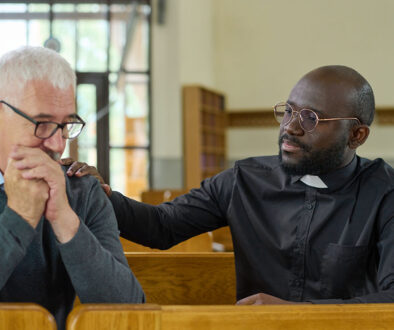Navigating End-of-Life Conversations: Our Guide
It’s a difficult subject to approach—probably the most challenging conversation you’ll have in your entire life. End-of-life conversations are complex, stressful, and complicated, but they are vitally important.
But where do you begin? How do you start?
You may be worried that the one you love may take offense or be resistant. Don’t worry: We’re here to help you with our useful guide.
“We understand that every situation is different, and that’s why we want you to know that we treat you like family, offering the same care, concern, and compassion that 3HC has been known for since our inception in 1981,” said April Brantham, CFRE, Director of Philanthropy.
Your Guide to End-Of Life-Conversations
Step 1: Prepare Yourself
You’re about to have an extremely emotional and sometimes distressing conversation. This is not the time to let your own health fall by the wayside.
It’s still vital that you take care of yourself, eat nutritious meals and exercise. You may want to engage in some of these stress relief techniques.
Remember to speak clearly and be patient. Your loved one is going through a difficult time and is often wrestling with complicated emotions themselves.
You also should be sure that your loved one is prepared. Try to select a time when they are pain-free or in minimal pain. It’s very important that they are lucid and aware of the importance of what you are saying. Ensure that you have privacy and you won’t be interrupted.
Step 2: Ask About Important Documents
Do you know where your loved one keeps their will? What about the deed to a property or title to cars?
All end-of-life documents are important, and it’s best to have a clear understanding of where everything is located. The last thing you want is to deal with this tedious task while you’re grieving.
Step 3: Work With Hospice Caregivers
Does your loved one understand hospice and end-of-life care? Have they established an acceptable pain level with their caregivers?
By working with our hospice team, you’ll be able to ensure that the one you love understands the care they are receiving.
Step 4: Ask Who Should Be in Charge of Your Care Decisions?
Even if your loved one has a living will, it’s still vital to be sure the family is all in agreement about the level of care and quality of life your loved one will experience. This can be a source of conflict among families, so having a clear direction will make things much easier later.
Step 5: Talk About Precious Memories
What was the world like when your loved one was a child? Do they have any favorite moments or memories? Perhaps they have humorous stories about relatives who have died.
Not everything about end-of-life conversations has to be heavy and serious. Embrace the lighter moments by reliving favorite events. You may want to record these to create a keepsake that will become a family treasure.
Step 6: Talk About the Memorial Service
Your loved one may have specific requests about how they want to be remembered or the memorial service. Consider asking the following questions, taking into account your loved ones spiritual or faith traditions:
- Who would you want to speak at your service?
- Do you want a funeral or memorial service?
- Is there any song or hymn that you’d like at your service?
- Are there any passages you’d like to be read? This may include poems or faith beliefs.
- Do you want to be buried, cremated or donated to science?
- Are you an organ donor?
When Your Conversation Is Over, It’s Not Completely Over
You’ve had the difficult end-of-life conversation. We’re glad and we’re sure you’re relieved.
But the process isn’t over yet.
If you and your loved one discussed legal matters pertaining to wills, living wills or trusts, it’s vital that you have these documented and examined by an attorney. It’s imperative to get expert legal advice—you don’t want to have to deal with an unbearable amount of details when your loved one has passed on.
When You Need Assistance With End-of-Life Conversations, 3HC Is Part of Your Family
We believe in caring empathy combined with excellence in health care. We believe in compassion and comfort for all.
In short, we believe in family.
With 3HC, we treat you like family, and a part of that is assisting you with having serious end-of-life conversations with those you love. Do you have questions about hospice care? Please contact us and discover how we can help.





